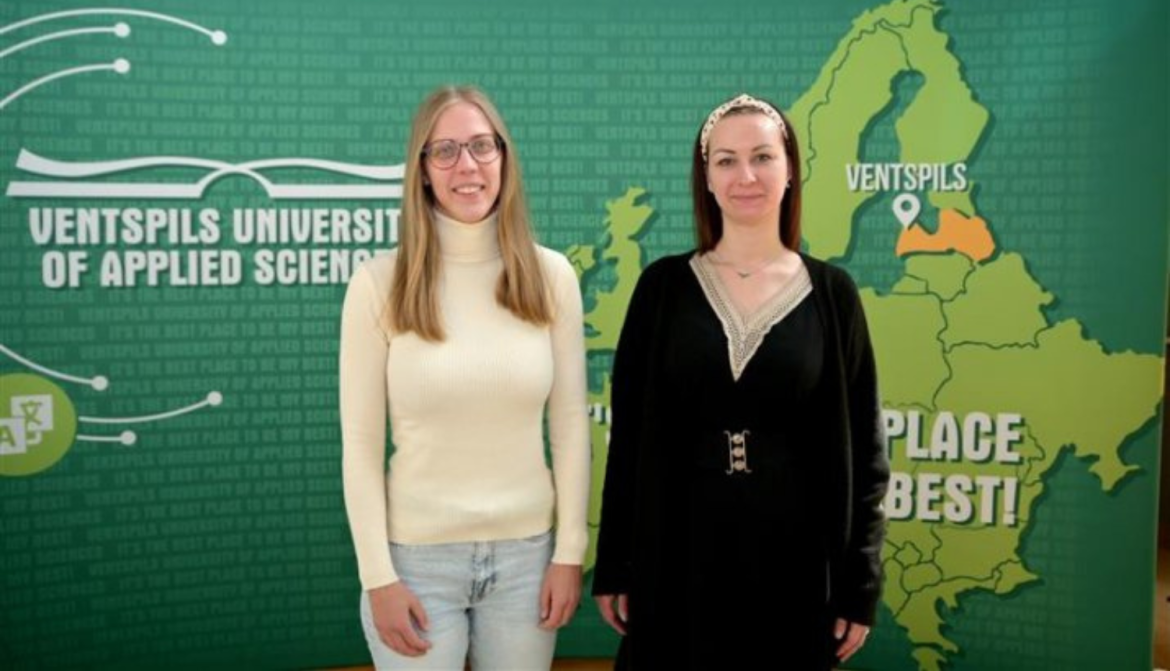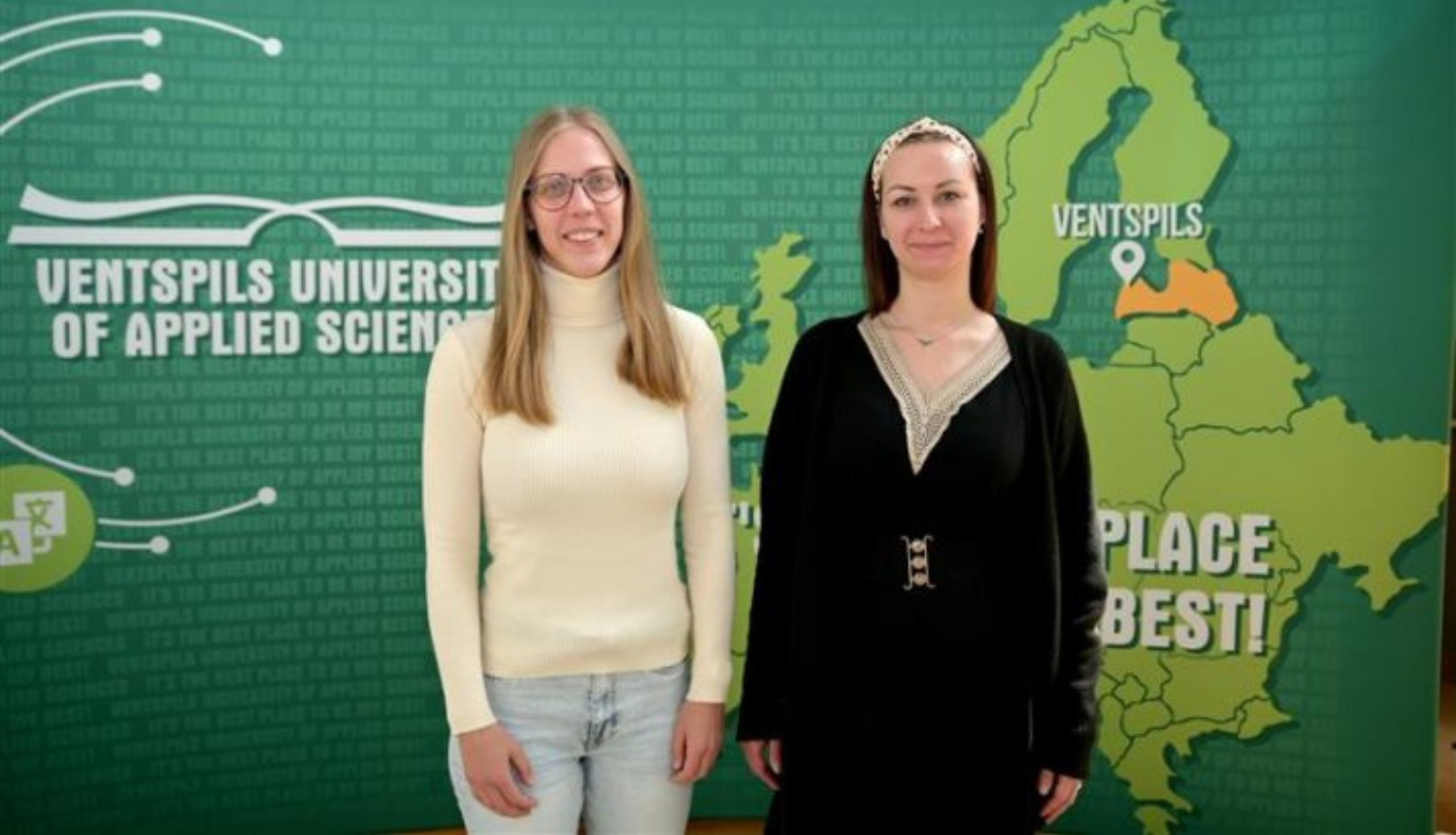Ventspils University of Applied Sciences participates in a national research initiative aimed at identifying evidence-based solutions to enhance and evaluate adult professional upskilling in Latvia, in collaboration with universities across the country.

Ventspils University guest lecturers and project participants Zane Zonberga and Sanita Lasmane shared insights into the project, outlining the core issues and potential solutions.
Rapid changes demand new skills
This project responds to the rapid changes in professions caused by technology, automation, and AI. Today, skills acquired even a few years ago may no longer match current labour market needs. Continuous upskilling is now essential to remain competitive and adaptable.
In this context, high-quality adult education and professional development become essential. This is also emphasised in Latvia’s National Development Plan 2021–2027 as part of the country’s sustainable development strategy, which aims to enhance adaptability to labour market changes.
Yet, adult education in practice often fails to meet the urgent upskilling needs of adults. This research project (No. VPP-IZM-Izglītība-2023/4-0001) aims to address these gaps by developing evidence-based approaches for effective adult upskilling and measuring the successful transfer of knowledge into the workplace.
Research driven by doctoral expertise
Zane Zonberga is a second-year doctoral student in the joint PhD programme Economics and Business offered by Ventspils University, Vidzeme University of Applied Sciences, and RTU Rēzekne Academy of Technologies. Sanita Lasmane has completed her theoretical studies in the same programme and plans to obtain her doctoral degree later this year. Her dissertation focuses on "Analysis and modelling of factors influencing the Latvian labour market," while Zonberga’s work explores "The impact of human capital development on organisational performance in Latvia".
Alongside them, the Ventspils University project team includes Professor Una Libkovska (scientific lead), Associate Professor Liene Resele-Dūšele, and project coordinator Linda Ūdre.
"A simple way to explain the project’s aim," Zonberga explains, "is this: a person who acquired technical or digital skills five or ten years ago might now find those skills nearly obsolete, due to rapid digitalisation and automation. Many jobs are at risk simply because employees can’t keep up. Our project aims to demonstrate that adult education is not only beneficial for individuals, but also crucial for businesses to thrive and compete effectively in a global market. We also aim to help organisations assess whether training is effective and whether it brings value to their workforce."
The project also emphasizes the need for educators to upskill, enabling them to deliver modern, practical, and market-relevant skills and knowledge.
Skills gaps across professions and regions
Professional upskilling is crucial across nearly all sectors, particularly in those sectors impacted by digitalisation, automation, and AI, such as customer support (replaced by chatbots) or warehouse operations (taken over by automated systems). This need applies broadly to all workers with skills acquired years ago that may now be outdated.
From interviews to collaborative solutions
The project is divided into five work packages involving data collection and analysis. One of the tasks conducted by the Ventspils University researchers was analysing 14 focus group interviews with industry representatives, expert councils, public authorities, and educational institutions. These interviews are being transcribed, coded, and analysed using both quantitative and qualitative research methods.
Additionally, the Ventspils team conducted assessments of the return on investment in human capital, including adult vocational and professional education, and its contribution to the Latvian economy. They also reviewed literature on how human capital development influences national economic growth and the effectiveness of knowledge transfer from training to real-world application.
Sanita Lasmane noted that, before this project, she primarily worked with quantitative methods, focusing on numerical data.
“This project shifts the focus toward qualitative methods, which help us understand hard-to-measure elements like attitudes and perceptions. These methods demand more contextual interpretation, and personally, it’s helped me broaden my research perspective,” she shared.
Practical tools and long-term goals
A central outcome will be a practical assessment tool, enabling organisations to measure if training programs deliver applicable workplace skills and drive real impact.
The project also aims to establish ongoing partnerships between education providers, businesses, and public institutions. This includes developing structures for involving industry professionals as guest lecturers and creating feedback mechanisms to ensure that educational programs are aligned with labour market needs. Over time, these measures are expected to foster more relevant curricula and facilitate smoother transitions between learning and employment.
Challenges: fragmented communication and lack of awareness
Researcher Zane Zonberga highlighted one persistent challenge: fragmented communication among stakeholders, including employees, employers, municipalities, national authorities, and educational institutions.
“This fragmentation hinders effective cooperation. Employers often lack tools to accurately assess their employees' training needs, and municipalities want to support local businesses but may not know how to do so. Meanwhile, national institutions need to ensure their training initiatives meet industry needs,” she explained.
She provided the example of training offered by the State Employment Agency (NVA), which, according to many employers, often fails to align with actual workforce requirements. Furthermore, strict eligibility criteria for various funding programs make them difficult for many companies to access.
Zonberga emphasised: "The current professional development offer is substantial, but people often don’t know about it."
For example, Ventspils University offers standalone accredited courses for a fee — participants can earn credit points and receive certificates while studying part-time. Similar opportunities are available at other universities and lifelong learning centres, including free courses; however, availability can depend on the instructors' capacity and initiative.
Sanita Lasmane highlighted regional disparities: "Opportunities exist, but they are concentrated in economically stronger regions. The biggest labour market deficiencies are in rural areas where access to training is limited." Zonberga agreed: "In Riga, there are far more training options, especially in sectors like medicine, which Ventspils University cannot provide."
The need for deeper cooperation with industry
The researchers stress the importance of collaboration with businesses. Ventspils University already cooperates with companies like Bucher Municipal, which offers students scholarships and practical experience within the company.
"We need broader cooperation - not just with a few companies. Entrepreneurs should be encouraged to give guest lectures and engage with students on real labour market issues. At Ventspils University, we’ve seen success here partly because many local business leaders are alumni and are motivated to stay involved," said Zonberga. "We already invite industry experts and company representatives to give guest lectures and lead practical sessions, but there’s room for even more."
The project, which runs from December 2023 to December 2026, is expected to yield several key outcomes: a practical tool for evaluating training effectiveness, guidelines for designing industry-responsive education, and frameworks for ongoing stakeholder cooperation. These results will inform policy development and support ongoing dialogue with the Ministry of Education and Science, ensuring that research findings are translated into actionable improvements in Latvia’s adult education system.


